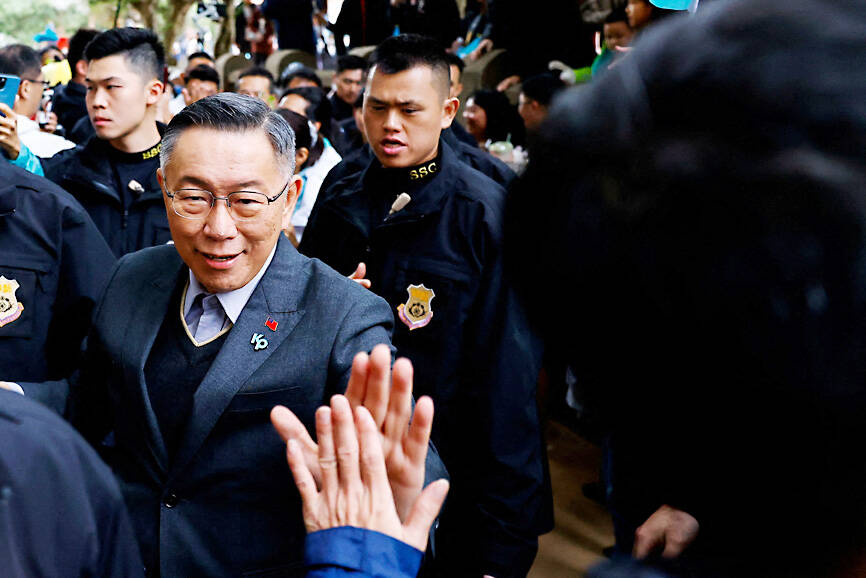If elected, Taiwan People’s Party (TPP) Chairman and presidential candidate Ko Wen-je (柯文哲) would form a coalition government, and might even ask former presidents to recommend candidates for the position of premier, who lawmakers could then choose from, he said in an interview published on Tuesday,
The government is run like a “dictatorship presidential system” or an “elected emperor system,” Ko said in an exclusive interview with Mirror Media magazine.
He said if he is elected, he would establish constitutional conventions so the president would be required to report and answer questions at the Legislative Yuan, appoint a premier with consent from the legislature, and freeze the budgets of the Control Yuan and Examination Yuan to balance and separate executive, legislative and judicial powers.

Photo: Ann Wang, Reuters
Ko said he would form a coalition government, enabling political parties to “become shareholders.”
For example, former presidents would each be asked to nominate two candidates for the position of premier, who lawmakers would vote on, he said.
Asked why he would make the best president, Ko said that only he can deal with China and the US, and the pan-blue and the pan-green camps at the same time.
He said if the presidential candidates were classified as “preferable, acceptable, tolerable and intolerable,” then only he would be considered “acceptable” by China and the US, while the Democratic Progressive Party’s (DPP) presidential candidate, Vice President William Lai (賴清德), would be considered “intolerable” by China, and the Chinese Nationalist Party’s (KMT) presidential candidate, New Taipei City Mayor Hou You-yi (侯友宜), would be “preferable” to China, but the US might give him a “question mark.”
Ko also asked if Hou is being a responsible mayor, as he took leave from his post only a month after being re-elected for a second term.
He said that the TPP is different from the KMT in that “aside from a few, KMT officials have been bought off by China.”
Although Hou said that he is against China’s “one country, two systems” policy, he embraces the so-called “1992 consensus,” and that when Chinese President Xi Jinping (習近平) talks of the “1992 consensus” Taiwan formula, it means there might be “one country, three systems,” Ko said.
He said as long as Taiwan maintains its current democracy, freedom, political system and lifestyle, he is willing to communicate with China.
The so-called “1992 consensus,” a term former Mainland Affairs Council chairman Su Chi (蘇起) in 2006 admitted making up in 2000, refers to a tacit understanding between the KMT and the Chinese government that both sides of the Strait acknowledge there is “one China,” with each side having its own interpretation of what “China” means.
Ko said Lai would not be a suitable president, as the risk of war would be heightened and the economy would worsen, as about 40 percent of Taiwan’s exports go to China and it would be difficult to suddenly change this.
The DPP would fail in communicating with China because it promotes “desinicization,” he said.

An essay competition jointly organized by a local writing society and a publisher affiliated with the Chinese Communist Party (CCP) might have contravened the Act Governing Relations Between the People of the Taiwan Area and the Mainland Area (臺灣地區與大陸地區人民關係條例), the Mainland Affairs Council (MAC) said on Thursday. “In this case, the partner organization is clearly an agency under the CCP’s Fujian Provincial Committee,” MAC Deputy Minister and spokesperson Liang Wen-chieh (梁文傑) said at a news briefing in Taipei. “It also involves bringing Taiwanese students to China with all-expenses-paid arrangements to attend award ceremonies and camps,” Liang said. Those two “characteristics” are typically sufficient

A magnitude 5.9 earthquake that struck about 33km off the coast of Hualien City was the "main shock" in a series of quakes in the area, with aftershocks expected over the next three days, the Central Weather Administration (CWA) said yesterday. Prior to the magnitude 5.9 quake shaking most of Taiwan at 6:53pm yesterday, six other earthquakes stronger than a magnitude of 4, starting with a magnitude 5.5 quake at 6:09pm, occurred in the area. CWA Seismological Center Director Wu Chien-fu (吳健富) confirmed that the quakes were all part of the same series and that the magnitude 5.5 temblor was

The brilliant blue waters, thick foliage and bucolic atmosphere on this seemingly idyllic archipelago deep in the Pacific Ocean belie the key role it now plays in a titanic geopolitical struggle. Palau is again on the front line as China, and the US and its allies prepare their forces in an intensifying contest for control over the Asia-Pacific region. The democratic nation of just 17,000 people hosts US-controlled airstrips and soon-to-be-completed radar installations that the US military describes as “critical” to monitoring vast swathes of water and airspace. It is also a key piece of the second island chain, a string of

The Central Weather Administration has issued a heat alert for southeastern Taiwan, warning of temperatures as high as 36°C today, while alerting some coastal areas of strong winds later in the day. Kaohsiung’s Neimen District (內門) and Pingtung County’s Neipu Township (內埔) are under an orange heat alert, which warns of temperatures as high as 36°C for three consecutive days, the CWA said, citing southwest winds. The heat would also extend to Tainan’s Nansi (楠西) and Yujing (玉井) districts, as well as Pingtung’s Gaoshu (高樹), Yanpu (鹽埔) and Majia (瑪家) townships, it said, forecasting highs of up to 36°C in those areas